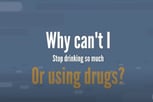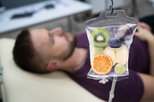The prospect of going to treatment terrified me. Despite knowing I had substance abuse problems, I was stuck between wanting to do something about it and not caring. It was a hopeless existence.
People have asked me if I think I would have gotten help sooner if I had a relationship with a Higher Power. My answer is always, “I honestly don’t know.” Even today, eight plus years into recovery, I can clearly remember the feeling of loneliness and despair that accompanied the belief that I was in this fight alone. If I would have felt like a Higher Power was standing with me in battle—a feeling I enjoy today—it may have made a difference.
However, I’m grateful for taking a three-pronged approach to recovery in the form of day treatment, outpatient care and aftercare.
Day Treatment
Looking back on my early recovery, it’s apparent that a Higher Power was working for me, even without me knowing. After a friend of a friend convinced me to give day treatment a try, I was initially resistant. Although I did eventually agree, I entered treatment with the personal understanding that if I didn’t like it, I would quit. I had been a runner all my life, and I always needed to know there was an exit strategy.
Day treatment turned out to be amazing. I quickly discovered that I didn’t need to fight my addiction alone. The counselors spoke a language I immediately understood. Also, it was comforting and empowering to sit in a room with people engaged in the same battle against addiction. After a few weeks, I was hooked. I didn’t want to leave.
As I was nearing my discharge date, I started to panic. Sure, I was able to stay clean and sober through treatment, but I was at the hospital nine hours a day and knew I could be drug tested at any time. Completing treatment meant I was on my own again. I didn’t trust myself, the program, or my Higher Power enough to continue the fight alone.
Outpatient Care
My counselor sensed my apprehension and mentioned the possibility of going to outpatient treatment after discharge. I would attend night sessions three times per week. Although my counselor would be new, it was through the same treatment center and I trusted them. I eagerly agreed. Not only did it help me transition into the “real world” slowly, it also kept me accountable. Because I lived alone, I was worried that voice of my addiction would override my newfound recovery voice. Even today, I am a train wreck when left to my own devices.
I attended outpatient treatment for six weeks. It was the perfect step-down from the day program. I continued to make new friends in recovery and started investing myself in the program even more. I liked the freedom outpatient afforded me while still keeping me on track. Had I gone to outpatient first, I don’t know if I would have been successful.
Throughout the stages of treatment, the counselors stressed the importance of finishing all parts of the tri-fold approach to recovery: day treatment, outpatient and aftercare. Although each stage was facilitated by a different counselor, I maintained relationships with them all, giving me the continuity and safety I craved. As I approached the end of outpatient, I felt confident that I was emotionally and spiritually ready to transition to aftercare.
Aftercare
The aftercare counselor and I already had a strong bond that was developed during day treatment, which made the transition easy. The group was held once per week for 90 minutes. It was just enough time to keep me accountable and focused on forward movement. There was also a hour of one-on-one therapy available, which I also eagerly accepted.
As the AA Big Book puts it, I had a long history of doing things the “easier, softer way.” I had promised myself at the beginning of day treatment that I wasn’t going to fall into that trap again, which is why I followed each step in the program to the letter. I trusted my counselors and believed that they knew better than I did at that point in my life.
Everyone enters recovery differently and everyone has to find their own path to success. For me, I needed the three-pronged approach. Some of you may not. I had failed at recovery many times and knew that doing the same old thing was going to get me the same old results. I had to try something different and am grateful I was given the opportunity to do so. Completing the entire program was a huge confidence boost and I finally felt like I was invested in my recovery.
I haven’t looked back since.
|
If you or someone you know is seeking help from addiction, please visit our directory of treatment centers or call 800-891-8171 to speak to a treatment specialist. |








